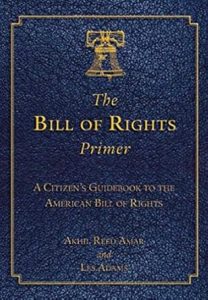 Summary: A discussion of the history and role of the Bill of Rights.
Summary: A discussion of the history and role of the Bill of Rights.
I have previously read Akhil Amar’s America’s Constitution: A Biography. One of my complaints about that book was that I thought it did not have enough focus on the Bill of Rights. I didn’t realize when I read it that Akhil Amar had already written a long book on the Bill of Rights. This book, The Bill of Rights Primer, is designed to be a more popular level book covering the same rough content.
This oversimplifies, but the rough thesis of the book is to give a history of how the Bill of Rights was developed and understood by the original writers. And then a discussion of how the 14th Amendment and the Reconstruction Era changed how the Bill of Rights was understood and used. I decided to pick up this book after I listened to a podcast with Amar on Advisory Opinions. Primarily they discussed constitutional interpretation. Amar is a liberal originalist and one of the early members of the Federalist Society, which is generally a conservative legal group. That podcast helped me understand Amar’s approach to America’s Constitution and The Bill of Rights Primer. While I think that Amar raises legitimate points to critique constitutional interpretative theory, especially of liberals, I still found weaknesses of originalism’s approach to be under-discussed.
That being said, it is very helpful to understand how the Bill of Rights has changed because of the 14th Amendment. I think one of the weaknesses of the modern originalist framework is that it seems to prioritize the original writer’s understanding, not the Reconstruction Era revision. The original authors of the Constitution were primarily slaveholders, did not believe that women should vote, and mostly did not believe in direct democracy. I tend to think we should prioritize interpreting the earlier amendments through the later amendments.
Immediately after reading The Bill of Rights Primer, I started reading At the Dark End of the Street: Black Women, Rape and Resistance–A New History of the Civil Rights Movement from Rosa Parks to the Rise of Black Power by Danielle McGuire. In the Bill of Rights Primer, Amar and Adams discuss how the grand jury was originally viewed as a check on governmental authority because grand juries could refuse to prosecute crimes that they viewed as unconstitutional or not crimes. But as At The Dark End of the Street detailed, the refusal of grand juries to call rape or murder or lynching a crime and releasing white perpetrators when the victims were black is acceptable in the originalist reading of the 7th Amendment, but it seems to violate the 14th Amendment by creating a system where crimes against black citizens were not prosecuted and where governmental officials (primarily police and officials that administrated voting) were able to use their authority to enforce segregation in violation of the spirit of the 14th Amendment.
Amar and Adams do discuss this problem, but I think without more history like what is discussed in At the Dark End of the Street, it is easy to think about originalism as an abstract theory of reading the constitution and not a theory that has historically been used to violate the rights of minority citizens within the US. Overall, I think that if you are interested in understanding the constitution, I would start with listening to the Advisory Opinion’s podcast (the sound is not great.) And then read America’s Consitution which has a good broad overview and history of the US. And then I would read Eric Foner’s history of the Reconstruction Amendments. And if you are still interested at this point, The Bill of Rights Primer does add to that conversation.
As a Christian who has read pretty widely in biblical hermeneutics, I think that the background there does have some relevance to other areas of literary or constitutional interpretation. It is interesting to me that generally, the courts do read the 1st Amendment through the lens of post-14th Amendment theory even if they do not always read other amendments that way. The early interpreters of the 1st Amendment did not believe that it really gave a free speech and religious rights to individuals. There are many examples of this, but one blatant one is that “In 1859 North Carolina sentenced the elderly Reverend Daniel Worth to a year in prison for circulating an anti-slavery tract. Then the state rewrote its laws to make “incendiary” antislavery expression punishable by death for the first offense.” The fact that there could be a death sentence for speech that was inspired by religious belief is a very different understanding of the 1st Amendment than what is generally understood today. Originalist readings of the 1st Amendment are not reading that history without another interpretive theory overlaying it.
The Bill of Rights Primer: A Citizen’s Guidebook by Akhil Reed Amar and Les Adams Purchase Links: Paperback, Kindle Edition, Audible.com Audiobook (currently free in the Plus library)